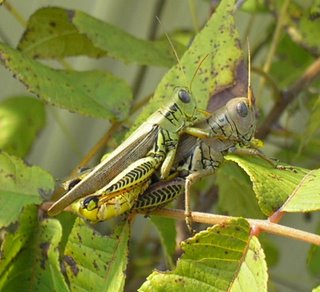Not long ago, I entered a personal essay in a writing contest. I knew the essay wasn’t very good—too thematically weak, too schmaltzy, and too cliché-ridden—but the contest had no entry fee, so I had nothing to lose. Since I’d entered the contest just before the deadline, I didn’t proofread as carefully as I should and let a couple of typos slip in. The judge caught all of those. She wrote some good comments in case I ever want to rewrite this essay.
However, the judge caught some other errors that weren’t even errors. For example, she wanted me to leave extra spaces after periods
. ARRRRRGGGGGHHH!“Two spaces=typing. One space=word processing.” I’d drummed this message (Ooh, that’s a cliché—sorry!) into the iPod earphone-enhanced heads of my English 101 students for more semesters than I care to count (Ooh, that’s trite—sorry!).
From page 206 (top) of the
Little Brown Handbook (9th ed.):
Leave one space after all punctuation, with these exceptions:
Dash
Hyphen
Apostrophe with a word
Two or more adjacent marks
Opening quotation mark, parenthesis, or bracket
The exceptions are the marks that have NO spaces after them. In the world of computer- composing, two spaces is an error. How can anyone proficient enough to judge a writing contest not know that? Thousands of websites, including the
Chicago Manual of Style, provide this information.
Another punctuation rule from the
Little, Brown Handbook (p. 506) is this: “Use a dash to indicate sudden changes in tone or thought and to set off some sentence elements.” If a sentence already has commas (i.e., a series), the dash can be used to “set off and emphasize nonessential elements.” The correct dash is, of course, the em dash (an unbroken line the length of the letter
m). This judge thought my em dashes were hyphens—“Change hyphens to commas,” she wrote in the margin—and changed all of my em dashes to commas. (I just used em dashes correctly in the previous sentence. See? Commas wouldn’t work.) Dashes are not hyphens, even though—in those long ago days of typing—two hyphens used to equal a dash. How did we used to type an en dash that’s used between time periods (i.e., 11:03–11:09 p.m.) and is longer than a hyphen (-) but shorter than an em dash (—)?
Besides punctuation, the judge also made a stylistic change that didn’t help. According to the
Little, Brown Handbook (p. 795), a writer should “use the present tense of verbs to describe both the action in a literary work . . . and the writing of an author. . . .”
Every time you read a book the action happens now. Even if the author wrote hundreds of years ago, the action continues to happen now. Movies are literary works. Every time you see a movie, the action happens now.
In my essay, I’d fudged the present tense rule a bit by using the
past progressive tense to describe what happened in movies I’d seen as a kid: “In the movies, Roy Rogers was always galloping Trigger. . . .” Progressive tenses allow the action to continue. The judge changed my description of action in a movie to “Roy Rogers always galloped Trigger.” Not quite the same shade of meaning: past tense means it’s over, done, finished, etc. In a movie, it’s never over.
Speaking of “over, done, finished,” I guess I’ve almost finished my punctuation/tense rant. But it’s ONE SPACE after a period!
ONE SPACE! Everybody got that?
As bad as my essay was, it still got second place.
















